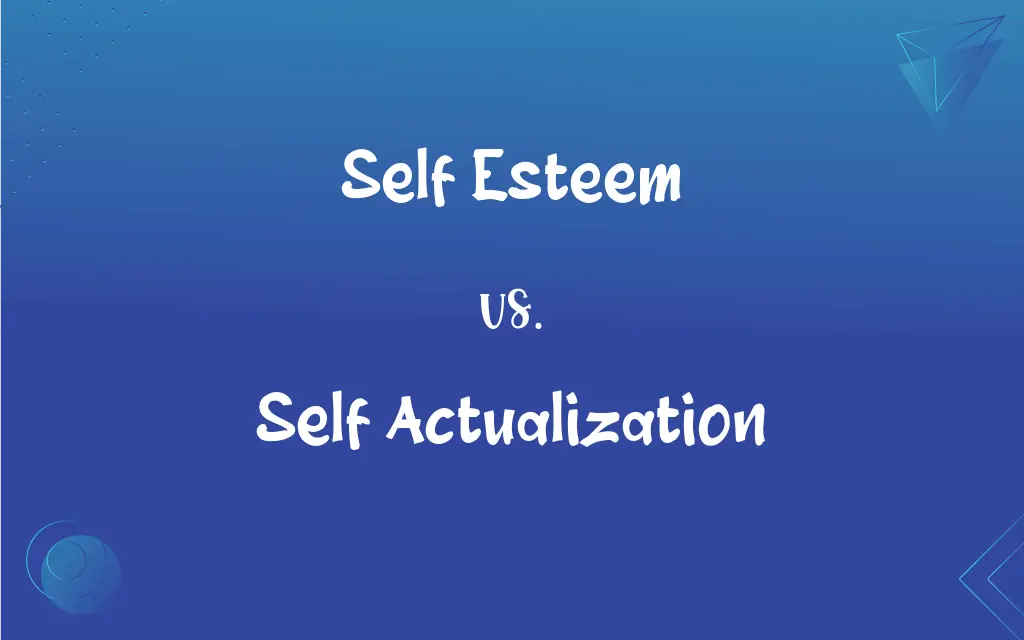Self Esteem vs. Self Actualization: What's the Difference?
Edited by Aimie Carlson || By Janet White || Published on June 26, 2024
Self-esteem is an individual's subjective evaluation of their own worth, while self-actualization is the realization or fulfillment of one's talents and potentialities.

Key Differences
Self-esteem is about how we value and perceive ourselves, often influenced by external validation and internal self-assessment. Self-actualization, on the other hand, is about achieving one's highest potential and fulfilling one's purpose.
In Maslow's hierarchy of needs, self-esteem is a lower-level need compared to self-actualization, which is at the top. Self-esteem is about respect and confidence, while self-actualization is about personal growth and self-fulfillment.
Self-esteem focuses on self-worth and confidence in one's abilities, while self-actualization is about realizing and expressing one's unique talents and capabilities.
High self-esteem is often a prerequisite for self-actualization, as it provides the confidence needed to pursue and realize one's potential. However, self-actualization goes beyond self-esteem to encompass a broader sense of purpose and fulfillment.
Self-esteem can be developed through positive reinforcement, achievements, and self-reflection. Self-actualization involves a continuous process of growth, self-discovery, and the pursuit of meaningful goals.
ADVERTISEMENT
Comparison Chart
Definition
Evaluation of one's own worth
Realization of one's potential
Hierarchy of Needs
Lower-level need (esteem needs)
Top-level need (self-fulfillment needs)
Focus
Self-worth and confidence
Personal growth and fulfillment
Achievement
Confidence to pursue goals
Realizing and expressing unique talents
Development
Through positive reinforcement, achievements
Continuous growth, self-discovery
ADVERTISEMENT
Self Esteem and Self Actualization Definitions
Self Esteem
Respect for oneself.
Positive feedback boosted his self-esteem.
Self Actualization
Realizing one's talents and potentialities.
His work in charity is a form of self-actualization.
Self Esteem
Confidence in one's own abilities.
Her self-esteem soared after winning the competition.
Self Actualization
Achieving one's full potential.
Meditation helped her on her journey toward self-actualization.
Self Esteem
Trust in one's own abilities.
High self-esteem is linked to success in life.
Self Actualization
Discovering and expressing one's unique abilities.
Writing novels was her way of achieving self-actualization.
Self Esteem
Acknowledgment of one's worth.
Practicing self-care is essential for maintaining self-esteem.
Self Actualization
Continuous growth and improvement.
Lifelong learning is key to self-actualization.
Self Esteem
The sense of one's own value.
Therapy helped him improve his self-esteem.
Self Actualization
Moments of maximum psychological growth.
Climbing the mountain was a peak experience in his self-actualization.
Self Esteem
Pride in oneself; self-respect.
Self Actualization
To develop or achieve one's full potential.
Self Esteem
Confidence in one's own worth; self-respect.
Self Actualization
Psychological development that can be achieved when all basic and mental needs are fulfilled.
Self Esteem
The holding a good opinion of one's self; self-complacency.
Self Esteem
A feeling of pride in yourself
Self Esteem
The quality of being worthy of esteem or respect;
It was beneath his dignity to cheat
Showed his true dignity when under pressure
FAQs
How are self-esteem and self-actualization related?
Self-esteem is often seen as a prerequisite for self-actualization, as it provides the confidence needed for personal growth.
Is self-actualization achievable for everyone?
Self-actualization is a continuous process and can be pursued by anyone, though the degree of realization may vary.
What is self-esteem?
Self-esteem is the subjective evaluation of one's own worth or value.
Can self-esteem fluctuate?
Yes, self-esteem can fluctuate based on experiences, achievements, and external feedback.
What are some characteristics of self-actualized individuals?
Self-actualized individuals often exhibit creativity, autonomy, a sense of purpose, and a deep appreciation for life.
What role does self-esteem play in mental health?
Healthy self-esteem is crucial for mental well-being, as it influences one's outlook on life and resilience to stress.
What is self-actualization?
Self-actualization is the realization or fulfillment of one's talents and potentialities.
Can high self-esteem be harmful?
Excessively high self-esteem, or narcissism, can lead to negative behaviors and a lack of empathy for others.
How does self-actualization impact happiness?
Self-actualization is associated with a deeper sense of fulfillment and happiness, as it involves living in accordance with one's true self.
How can self-esteem be improved?
Self-esteem can be improved through positive self-talk, achievements, and supportive relationships.
Are self-esteem and self-actualization static or dynamic?
Both self-esteem and self-actualization are dynamic processes that can evolve over time.
How do childhood experiences affect self-esteem?
Childhood experiences, including parenting style and early achievements, can have a lasting impact on self-esteem.
How do societal norms affect self-esteem?
Societal norms and expectations can impact self-esteem by influencing how individuals perceive their own worth.
Is there a correlation between self-esteem and success?
There is often a correlation, as higher self-esteem can lead to greater confidence and motivation to achieve success.
What is the role of self-esteem in relationships?
Healthy self-esteem is important in relationships, as it affects communication, trust, and the ability to form secure attachments.
What are some common misconceptions about self-esteem?
Common misconceptions include equating self-esteem with arrogance or believing that high self-esteem guarantees success.
Can self-actualization lead to social change?
Self-actualized individuals may contribute to social change by using their talents and insights for the greater good.
How can individuals balance self-esteem and humility?
Balancing self-esteem and humility involves recognizing one's worth while remaining open to learning and growth.
Can self-actualization change one's life goals?
Yes, as individuals pursue self-actualization, their life goals may evolve to reflect their deeper understanding of themselves.
How does culture influence self-actualization?
Cultural values and norms can shape the expression of self-actualization, as well as the paths individuals take to achieve it.
About Author
Written by
Janet WhiteJanet White has been an esteemed writer and blogger for Difference Wiki. Holding a Master's degree in Science and Medical Journalism from the prestigious Boston University, she has consistently demonstrated her expertise and passion for her field. When she's not immersed in her work, Janet relishes her time exercising, delving into a good book, and cherishing moments with friends and family.
Edited by
Aimie CarlsonAimie Carlson, holding a master's degree in English literature, is a fervent English language enthusiast. She lends her writing talents to Difference Wiki, a prominent website that specializes in comparisons, offering readers insightful analyses that both captivate and inform.






































































